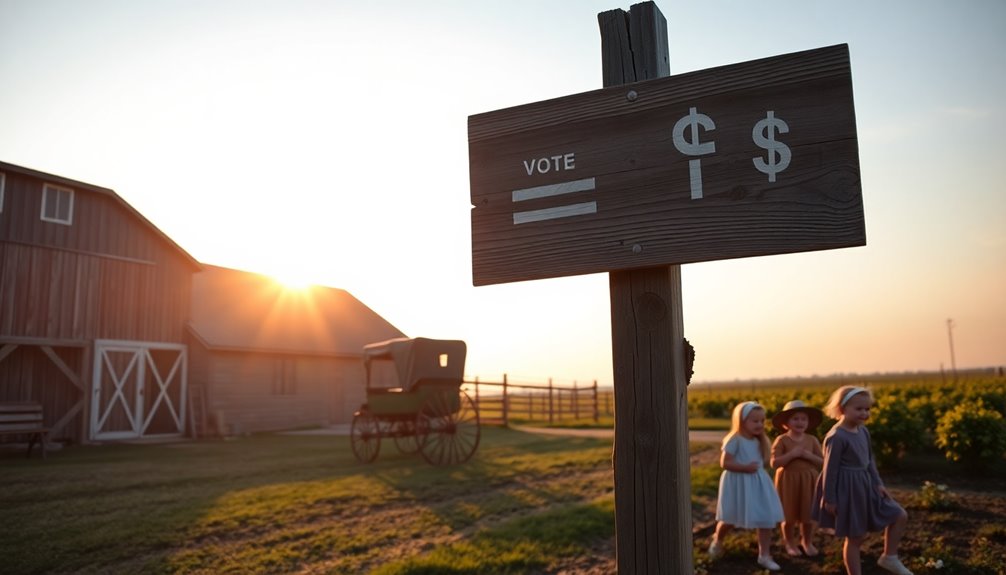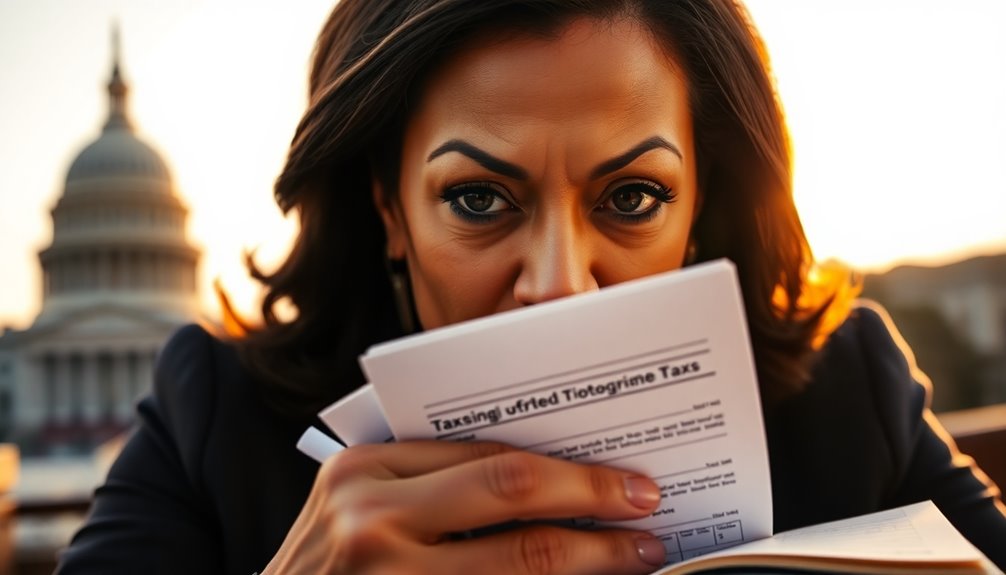Yes, the Amish do pay taxes. They contribute to federal income taxes on earnings and investments, along with property and sales taxes. However, they're exempt from FICA and FUTA taxes due to their religious beliefs. When it comes to voting, participation is very low; most Amish avoid elections because they prefer to focus on spiritual matters. Yet, some do vote, especially in local elections, and there's a growing movement to encourage more engagement in the political process. If you're curious about how these practices might be changing, you might find the details interesting.
Key Takeaways
- The Amish pay federal income taxes on income from investments, wages, and self-employment, as well as state income taxes based on residence.
- They are exempt from FICA and FUTA taxes due to religious beliefs but still pay income, sales, and property taxes.
- A significant portion of the Amish population typically abstains from voting, with less than 10% participating in elections.
- Voting preferences among those who participate often lean towards Republican candidates, reflecting their conservative values.
- Recent events have led to increased political engagement among the Amish, with grassroots efforts to mobilize voters for upcoming elections.
Types of Taxes Paid
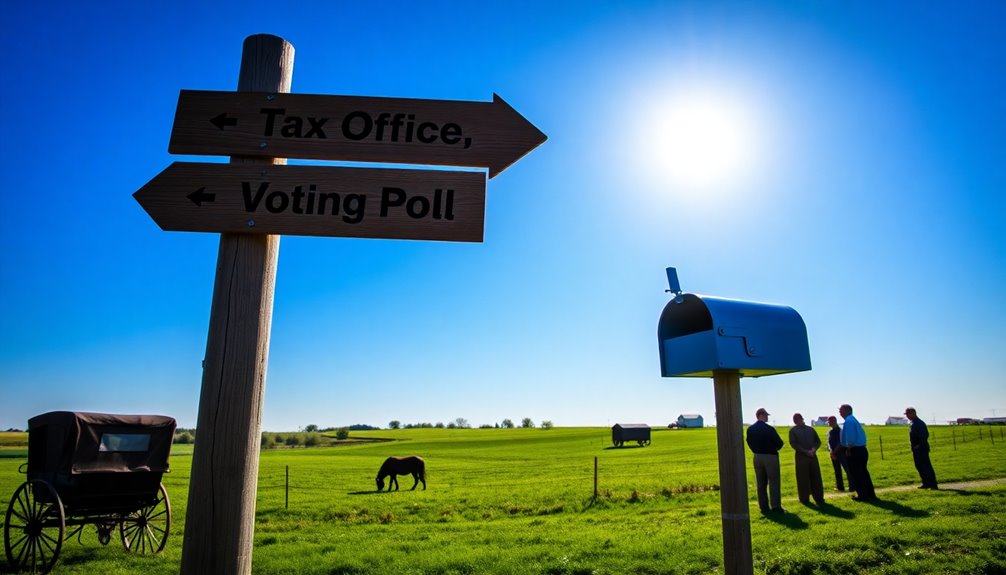
The Amish community, like all American citizens, is subject to various types of taxes that contribute to the economy and local services. They pay federal income taxes on gains from investments, self-employment, and wages, just like everyone else.
In addition to federal obligations, the Amish are responsible for state income taxes based on where they reside, ensuring they adhere to both federal and state regulations.
When you consider sales tax, Amish individuals pay it on goods they purchase, including food and clothing. Their self-sufficient lifestyle may reduce overall sales tax liability, but they still face regional variations in tax rates. Notably, self-sufficient communities often pay minimal sales tax on purchases.
Property taxes also come into play, as the Amish pay taxes on residential properties, business properties, and farming lands, which fund vital local services.
Furthermore, customs duties apply to imported goods, reflecting their broader tax responsibilities. These duties are dictated by federal regulations and must be paid for both personal and business-related imports.
Tax Exemptions for the Amish
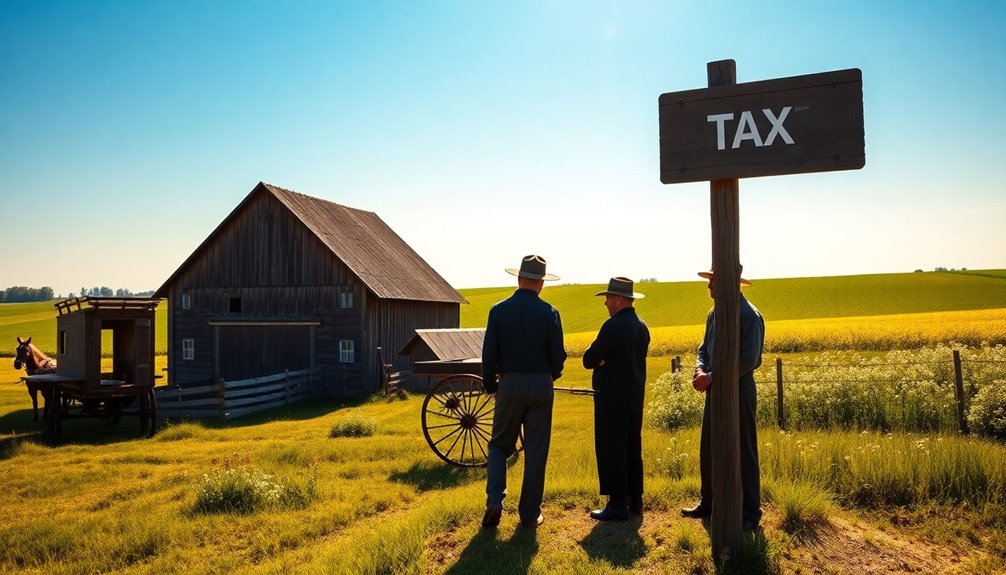
Many people wonder about the tax exemptions available to the Amish community, which stem from their deeply held religious beliefs and practices. The Amish oppose government insurance programs, believing in self-sufficiency and community care for the elderly and infirm. This perspective led to historical conflicts with the IRS, prompting Congress to recognize these exemptions in 1965.
The specific taxes exempted include FICA taxes, which fund Social Security and Medicare, and FUTA taxes for unemployment benefits. However, it's essential to note that these exemptions don't apply to income, sales, or property taxes. Interestingly, while the Amish typically avoid gasoline, they don't receive exemptions for state gas taxes.
To qualify for these exemptions, you must be a member of the Amish church and agree to forgo any benefits from Social Security or Medicare. You also can't have received public insurance benefits before applying. Self-employment is often a critical component for many Amish seeking tax exemptions because it allows them to align with their community's values while benefiting from the exemption process.
Once you decide to pursue an exemption, you'll need to submit a formal application to the IRS, and it only applies to earnings after approval.
Despite these exemptions, the Amish still comply with various tax laws, maintaining their religious principles while navigating the tax system.
Process for Obtaining Exemptions

Obtaining tax exemptions as an Amish individual involves a clear process rooted in specific eligibility criteria and adherence to religious beliefs.
To qualify, you must be a member of the Amish church and hold strong convictions against accepting government insurance programs. A key requirement is that you agree to forgo benefits from Social Security, Medicare, and unemployment for life. Additionally, you can't have received public insurance benefits previously, nor can anyone else receive benefits based on your earnings record.
The application process starts with filing a specific form with the IRS. This form includes a lengthy certification outlining your religious beliefs and your commitment to eschewing various types of public insurance. Furthermore, the Amish community also maintains compliance with local tax obligations, which includes paying property taxes like other residents.
Once submitted, the IRS will review your application and may disapprove it if you don't meet the criteria.
Voting Habits of the Amish
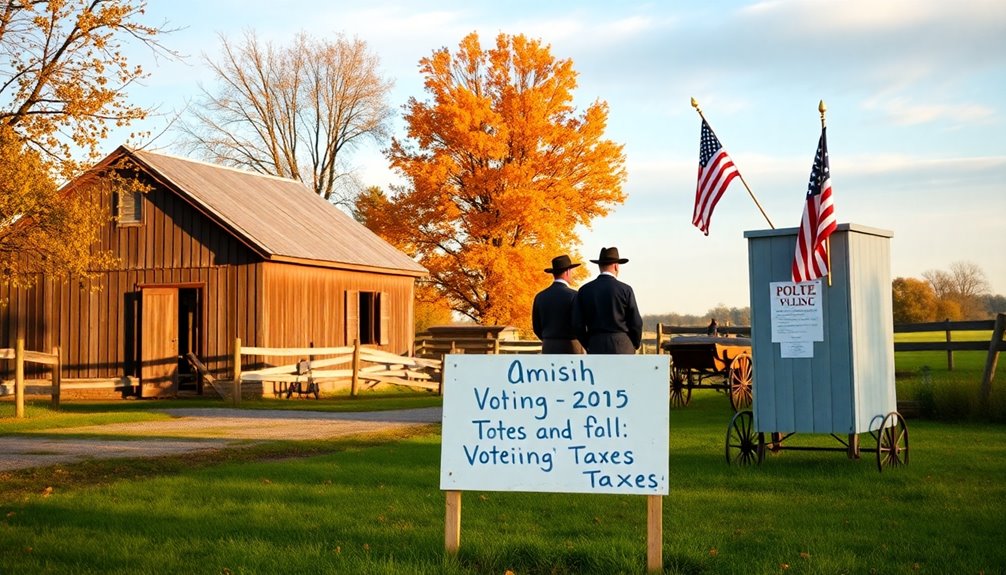
Although most Amish individuals tend to avoid participating in elections, a small minority does engage in voting, particularly during local issues or presidential elections. In the Lancaster area, about 3,000 Amish voted in 2020, with several hundred more across Pennsylvania. Typically, less than 10% of the Amish population casts a ballot, but voting rates increase when local matters are at stake. Approximately 3,000 Amish voted in Lancaster area during the last presidential election, highlighting their occasional engagement in the electoral process.
When they do vote, Amish individuals are more likely to register as Republicans, reflecting their conservative values. Rural Lancaster County has a historical tendency to support Republican candidates, influenced by the voting preferences of their neighbors.
Efforts to mobilize Amish voters include billboards, ads, and community meetings, alongside ride-share programs to facilitate transportation to polling places.
Interestingly, the Amish community has shown stronger participation during contentious issues like compulsory school policies in the 1950s. In recent elections, particularly in 2004 and 2020, there was notable support for Republican candidates.
As outreach efforts grow, the Amish voting turnout may continue to rise, making every vote particularly significant in swing states like Pennsylvania.
Reasons for Not Voting
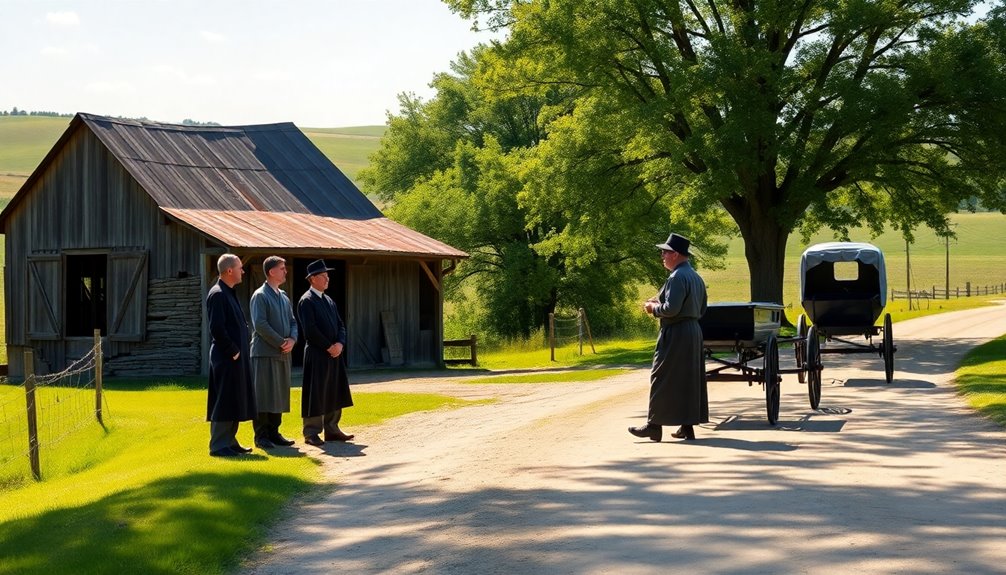
For the Amish, the decision not to vote often stems from deeply held theological beliefs. They adhere to a "two-kingdom" theology, emphasizing a clear separation between God's heavenly kingdom and earthly government. This belief shapes their identity, positioning them as citizens primarily of the spiritual realm rather than participants in earthly politics. Their focus is on living according to God's laws, steering clear of political entanglements. Additionally, the Amish community's minimal involvement in politics highlights their preference for spiritual matters over earthly affairs.
Culturally, Amish communities strive to maintain harmony and avoid divisiveness. Politics can create conflict, risking relationships among neighbors and within families. Their lifestyle prioritizes faith and community over political engagement, as they uphold non-resistance, believing that political actions are often futile in the grand spiritual scheme.
Historically, low voter turnout reflects this aversion, with participation declining significantly after the 1950s. Past experiences have reinforced their preference for separation from governmental affairs. Instead of voting, the Amish believe in the power of prayer for their leaders, viewing it as a more effective means of influence.
Their philosophy emphasizes self-sufficiency and community support, further distancing them from reliance on political systems.
Efforts to Court Amish Voters

In recent years, political groups have intensified efforts to engage Amish voters, recognizing their unique challenges and values. The Early Action Vote, a conservative political action group, has focused on personal outreach to this community, understanding their isolation from broader society.
While claims of 180,000 new Amish voter registrations have surfaced, the actual number of eligible Amish voters in Lancaster County sits closer to 17,000. In 2020, about 4,125 registered to vote, which was a significant increase from previous elections. Efforts to increase Amish voter participation aim to change the historically low turnout rates observed in past elections.
To facilitate participation, local organizations are organizing ride-shares and carpools, ensuring that Amish voters can reach polling places. Activist Scott Presler has played a crucial role in mobilizing these voters, particularly in response to government overreach issues, such as the raid on Amos Miller's farm. This incident has spurred a sense of urgency among the Amish to protect their traditional practices.
Despite their typically reserved approach to politics, the Amish community's engagement in the 2024 election reflected a commitment to safeguard their way of life. Their increased turnout signals a shift in how they view their participation in the political process.
Frequently Asked Questions
Do the Amish File Tax Returns Despite Exemptions?
Yes, the Amish file tax returns despite their exemptions.
If you're part of an Amish community, you'll need to complete a form with the IRS to certify your religious beliefs and apply for these exemptions.
Even if you qualify, you still have to file your returns and pay various taxes, like property and sales taxes.
Many Amish hire accountants to ensure they comply with tax laws while managing their unique financial situations.
How Do Amish Manage Tax Payments Without Traditional Banking?
You'll find that the Amish manage tax payments using cash and checks, avoiding traditional electronic banking.
They prefer collecting paper tax forms from local libraries or mail, and they file returns using handwritten records. Many even seek help from non-Amish accountants to translate their physical records into IRS forms.
Additionally, they rely on community banks that cater to their needs, ensuring they can access financial services without modern technology.
Are There Specific Taxes Amish Communities Oppose?
You'll find that Amish communities oppose certain taxes primarily due to their religious beliefs and commitment to self-sufficiency.
They reject Social Security and Medicare taxes, believing these government programs conflict with their values.
Additionally, they often avoid self-employment and welfare taxes, as they prefer to rely on their community for support.
This self-reliance shapes their overall approach to taxation, leading them to minimize their financial interactions with government systems.
What Drives the Small Amish Voter Turnout?
The small Amish voter turnout stems from their "two-kingdom" theology, which prioritizes spiritual over earthly governance.
You'll find that most Amish see voting as unnecessary, focusing on prayer for leaders instead.
Historical separation from government influences this view, and recent government actions have only slightly shifted their engagement.
As their community evolves from farming to small businesses, they might become more politically active, but the traditional mindset still dominates.
Do Amish Participate in Local Government Beyond Voting?
You'll find that Amish communities often engage with local government, especially when issues directly affect their lives.
They consult with local officials on matters like zoning and health care, ensuring their voices are heard.
While they typically avoid serving on government committees, they maintain respect for authority and work collaboratively on community concerns.
This interaction reflects their commitment to self-reliance and mutual care, prioritizing their community's needs over broader governmental involvement.
Conclusion
In summary, the Amish do pay certain taxes but enjoy exemptions that reflect their unique lifestyle. While some choose not to vote due to religious beliefs and a desire to remain separate from government, their community remains an important demographic. Understanding their perspective can help bridge the gap between their values and the political landscape. As efforts to engage Amish voters continue, it's essential to respect their choices and recognize their contributions to society.
